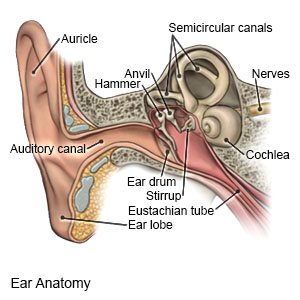Benign Paroxysmal Positional Vertigo
Medically reviewed by Drugs.com. Last updated on Aug 4, 2025.
AMBULATORY CARE:
Benign paroxysmal positional vertigo (BPPV)
is an inner ear condition that causes you to suddenly feel dizzy. Benign means it is not serious or life-threatening. BPPV is caused by a problem with the nerves and structure of your inner ear. BPPV happens when small pieces of calcium break loose and lump together in one of your inner ear canals.
 |
Common symptoms include the following:
You may feel that you or the room is moving or spinning. Turning your head, rolling over in bed, getting up or lying down may lead to sudden vertigo. You may also have any of the following symptoms:
- Nystagmus (quick shaky eye movement that you cannot control)
- Nausea
- Poor balance and feeling unsteady when you walk
Seek care immediately if:
- You fall during a BPPV episode and are injured.
- You have a severe headache that does not go away.
- You have new changes in your vision or feel weak or confused.
- You have problems hearing, or you have ringing or buzzing in your ears.
Contact your healthcare provider if:
- Your BPPV symptoms do not go away or they return.
- You have problems with your balance, or you are falling often.
- You have new or increased nausea or vomiting with vertigo.
- You feel anxious or depressed and do not want to leave your home.
- You have questions or concerns about your condition or care.
Management of BPPV:
- Your healthcare provider will teach you how to move your head and body to prevent symptoms. For example, he or she may teach you certain ways to move your head or body. These movements usually help relieve your symptoms and keep the dizziness from returning. The exercises help move the calcium pieces to a different part of your ear. Do the movements only as directed.
- Vestibular and balance rehabilitation therapy (VBRT) is used to teach you exercises to improve your balance and strength. VBRT may help decrease your dizziness and prevent injuries if you are at risk for falls.
- Medicines may be recommended or prescribed to treat dizziness or nausea.
Prevent your symptoms:
- Try to avoid sudden head movements. Stand up and lie down slowly.
- Raise and support your head when you lie down. Place pillows under your upper back and head or rest in a recliner.
- Change your position often when you are lying down. Try not to lie with your head on the same side for long periods of time. Roll over slowly.
- Wear protective gear when you ride a bike or play sports. A helmet helps protect your head from injury.
Follow up with your healthcare provider as directed:
You may need to return in 1 month to check the progress of your treatment. Write down your questions so you remember to ask them during your visits.
© Copyright Merative 2025 Information is for End User's use only and may not be sold, redistributed or otherwise used for commercial purposes.
The above information is an educational aid only. It is not intended as medical advice for individual conditions or treatments. Talk to your doctor, nurse or pharmacist before following any medical regimen to see if it is safe and effective for you.
Learn more about Benign Paroxysmal Positional Vertigo
Care guides
Further information
Always consult your healthcare provider to ensure the information displayed on this page applies to your personal circumstances.
